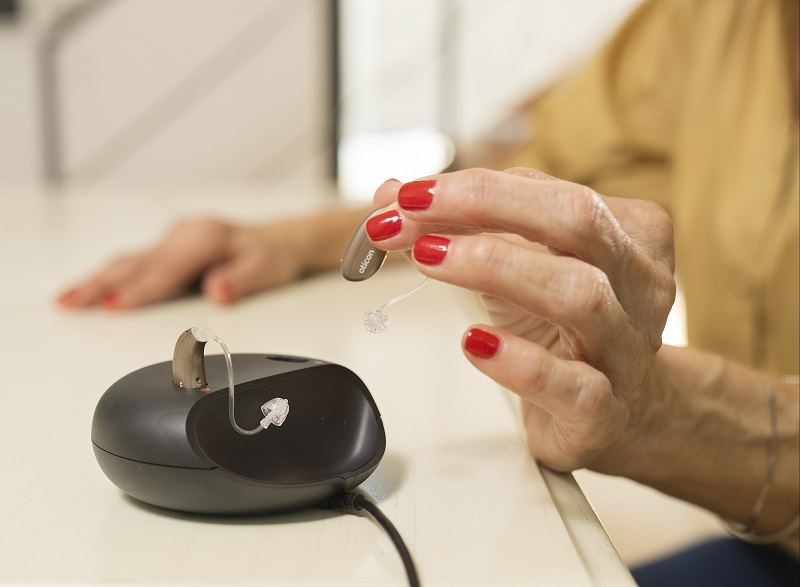|
www.HealthyHearing.com |
What to do with old hearing aidsExperts share their recommendations for hearing aids you don't need anymore
Contributed by Madeleine Burry Just got a new pair of hearing aids and aren't sure what to do with your old pair? Fortunately, you’ve got options if you (or a loved one) have one or several pairs of retired hearing aids. “Patients can donate hearing aids, exchange their devices for a discount on new hearing aids, or recycle their hearing aids,” says ENT and head and neck surgeon Nishant Reddy, MD, of NJ ENT. Another great option: Donating the hearing aids. Let's take a deeper look at the options: A spare set can come in handyaids on hand. Compared to your new hearing aids, your older set probably doesn’t feel quite so exciting. Still, if they can help you hear, it’s a good idea to hold onto them — just in case. “I always recommend patients hold onto their old hearing aids in the event that they need them again temporarily,” says Amanda J. Ucci, AuD, CCC-A, assistant professor of audiology at Columbia University Irving Medical Center, and audiologist at Columbia Doctors Midtown. “As long as the aids are still functional, they may come in handy if the new pair is lost or needs to be sent in for repair." Store your backup hearing aids (and their charger or a spare set of batteries) someplace handy, so you can remember where they’re located if you need them unexpectedly, Ucci recommends. Note: With rechargeable hearing aids, “the battery will likely not hold a full charge after sitting unused for a year or two,” Ucci says. That means these will be a good backup option for a few weeks or even a few months, but likely not a long-term solution. What about selling them?Given the hefty sticker price of hearing aids, it can feel appealing to sell them once you have a new pair. But our experts tend to recommend steering clear of this strategy (as well as purchasing secondhand hearing aids). “Selling hearing aids may not be straightforward and it's important to be aware of local regulations regarding such sales,” Dr. Reddy says. Facebook groups and resale sites like eBay or Craigslist, as well as local hearing centers, may be options for selling no-longer-needed hearing aids. But your older hearing aids are likely not in high demand. “Hearing aid technology is constantly evolving, and old technology is not typically desirable,” Ucci says. Come into an audiologist’s office with older hearing aids, and it may be hard for them to program (since old versions of the software may not be available) or find parts to service them, Ucci says. And that could inch up what you need to pay. “There is a cost to the patient for hearing aid programming visits too. So, even though they may have saved significantly on the cost of an outdated hearing aid, they may then spend more time in our offices for troubleshooting and sound quality issues that it does not pay off in the long run,” Ucci says. If you do sell them, make sure to clean and disinfect them first and also remove personal information, Dr. Reddy says. More about: Buying and selling used hearing aids See if you can trade them inYou may sometimes be able to exchange older hearing aids for a discounted rate for a new pair. (Think of this as being similar to when your cell phone company offers you a discounted rate on a new phone if you give them your old one.) Check with your audiologist or hearing care provider to see if this is an option. Donate your old hearing aidsA lot of positive things happen when you donate your hearing aids. For one thing, you divert them from a landfill (or from taking up space in your junk drawer), points out Jason E. Camis, IOM, executive director of Sertoma International and Hearing Charities of America. Plus, if you itemize your deductions on your tax returns, you may be able to deduct the donation. Most importantly: Your donation helps others hear. At the Hearing Aid Project (one of the nationwide programs run by Hearing Charities of America), about 2 percent of the donated hearing aids are passed along to needs-based recipients, Camis says. That percentage may seem low. But think about all those issues Ucci brought up earlier about older hearing aids. “We're trying to put hearing aids that are in good condition with newer technology into people's ears,” Camis says. That means only giving out working hearing aids that are under three years old, since those ones are still covered by the manufacturer’s warranty. But rest assured: Even those older hearing aids—the majority of what the Hearing Aid Project receives—still have a lot to offer. Slightly older hearing are set aside for mission-based programs. If hearing aids are just a bit past the three-year warranty coverage mark (say, four or five years old), they’re reserved for mission-based programs where audiologists travel outside of the United States to provide hearing care, Camis explains. The Hearing Aid Project recycles older hearing aids with manufacturers in exchange for cash or credit. Hearing aids that hit the 10-year mark may still work—they just won’t function as well as at the start of their lifespan. “We don't want to put something that's not an efficient use in somebody else's ears,” Camis says. But manufacturers are happy to take them back and offer cash or credit to charitable organizations such as the Hearing Aid Project. Can donate other hearing care items, tooIn turn, the Hearing Aid Project uses cash to support their work (sorting through tens of thousands of hearing aids is laborious, and requires two part-time staffers) and credits are used by the audiologists for supplies (think: ear molds). The Hearing Aid Project is just one place to donate your hearing aids to. You can also donate to local clinics and schools, as well as other charitable organizations such as Help America Hear. An online search may uncover local options, too. By the way, it’s not only hearing aids that you can donate. The Hearing Aid Project also welcomes cash donations as well as supplies, such as extra batteries, hearing links, TV hearing aids, hearing aid remote controls, and more. These donations are sorted, and added to an inventory list that’s offered to audiology partners at no cost. Madeleine Burry
|
Featured clinics near me
Earzlink Hearing Care - Reynoldsburg
7668 Slate Ridge Blvd
Reynoldsburg, OH 43068

Find a clinic
Need a hearing test but not sure which clinic to choose?
Call 1-877-872-7165 for help setting up a hearing test appointment.



 Madeleine Burry is a Brooklyn-based freelance writer and editor. She's written about health for several online publications, including Women's Health, Prevention, Health, Livestrong and Good Housekeeping. You can follow her on Twitter @lovelanewest.
Madeleine Burry is a Brooklyn-based freelance writer and editor. She's written about health for several online publications, including Women's Health, Prevention, Health, Livestrong and Good Housekeeping. You can follow her on Twitter @lovelanewest.